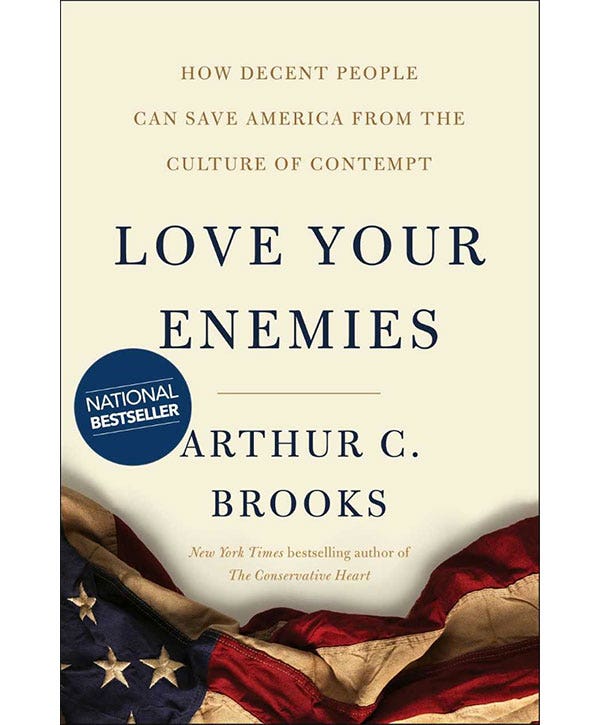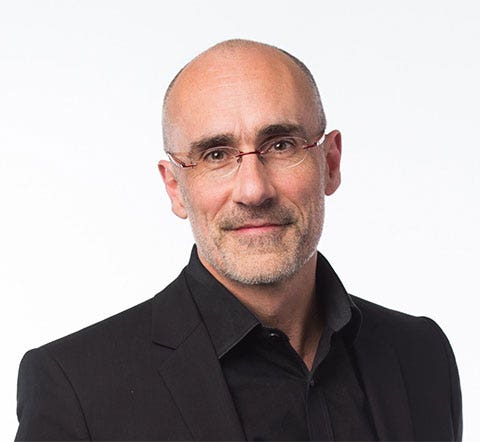Reached Your Peak? Now Teach and Be Happy, Says Arthur Brooks

Money can’t buy happiness but it helps, and there’s no denying the work you do—whether you’re in an office, performing physical labor, or both or neither—is a chunk of your identity. Behavioral social scientist Arthur C. Brooks, Ph.D., has observed that we assume we’ll prevail and rise through hard work, whatever it is that we do, and keep climbing indefinitely. But there’s some tough news for us: He’s found that we reach our professional peak a lot sooner than we think.
Sooner, as in, our 40s. And those early achievements we might have logged won’t sustain us.
If you’re in your 20s or 30s, you’re either thinking, I haven’t even figured out what I want to do with my life yet, or that won’t happen to me. If you’re in your 40s, you’re likely thinking, I’ve still got it and I can stay sharp and retire on my terms. If you’re in your 50s, you might be thinking, I’ve been working hard for decades and I still have another to go, so now what?
Luckily, Brooks—who led the American Enterprise Institute for a decade, recently published “Love Your Enemies” (Broadside Books, 2019) and just took up positions as Professor of the Practice of Public Leadership at the Harvard Kennedy School and Arthur C. Patterson Faculty Fellow at the Harvard Business School—has done the research to be able to forecast that peak, and the choices to make on the way up as well as on the other side.

Peak past your prime

Brooks is something of a Renaissance man out of interest and necessity, which probably predisposed him to study work and our happiness. A French horn prodigy, he left college to be a professional musician. But his performance plateaued in his 20s and began to fall—and to this day, he has no idea why. After several years fighting the fact that his performance was declining, Brooks quit music and went back to school, earning his bachelor’s, master’s and then a Ph.D. and launching a second career as a behavioral social scientist, writing New York Times best-selling books and columns on culture and policy topics, from charitable giving to political discourse.
It was a conversation overheard on a plane that prompted his latest research. A man behind him told his wife he wished he were dead, and when Brooks had a chance to look, he saw that the man was a very accomplished and famous individual. Even the pilot told the man that he’d been an inspiration since childhood.
Brooks began to wonder about his own happiness, recognizing that despite his prolific career and hard work, he would inevitably slow down. So he tackled the question and found evidence that early achievement was no guarantor of later happiness (and more likely, disappointment at failure to sustain it). He found research indicating that entrepreneurs peak in their 30s, writers in their 40s and 50s. Air traffic controllers must retire by 56. And historians peak in their 70s.

Then as we approach our 40s, Brooks advises shifting our focus and our work to capitalize on our crystalized intelligence. That’s our ability to synthesize and teach the knowledge we’ve accumulated over the years—the reason why historians’ peak performance comes so late in their careers. Brooks says that’s why his professor peers receive the highest accolades as they age, and he plans to do more by taking on less (and letting younger colleagues initiate new research).
Lift happy

According to Brooks’ presentations at the Aspen Ideas Festival, we have less control over happiness than we think, so we’d better make the most of what we can. He cites research indicating that half our happiness is determined by our genes; the other half is shaped mostly by circumstance and to a lesser extent by our commitment. He explains four areas in which we can act to be happy: in addition to work, spiritual enlightenment, family and community (friendships, relationships).
But in a recent conversation, Brooks enthusiastically adds health—and fitness—to the list. He describes health as habits that fulfill “a commitment to be fully aware and alive to exploit your circumstances.” Brooks explains, “It’s a really important aspect that people should be thinking about in the back half of life.”

Brooks subscribed to a fitness magazine and began to study up. He still treats his fitness regimen just like any other research project, even creating a meta-macro framework. (“For optimal health, 40 percent of my focus is diet, 30 percent is exercise, 20 percent is sleep and about 10 percent is supplementation,” he says.) He gets up around 4:45 a.m., checks email and is at the gym working out by 5:15—wrapping up at 6:15.
“I change up my routine once a month to keep in a state of physical confusion,” he explains. Brooks lifts weights three times a week. (“After age 40, you lose upper-body strength really fast, and it’s hard to build muscle mass because of lower testosterone levels,” he says.) Once a week, he combines lifting and cardio, and the remaining two days, he does low-intensity cardio.
The ultimate risk and reward

The connection to happiness, Brooks says, extends beyond longevity or neurochemistry. Fitness also cultivates fortitude and perseverance, he says. “Research says there’s a direct correlation between conquering physical challenges and overcoming challenges in life. That’s why psychiatrists give you things to do that are physically scary before they will give you something to do that’s mentally scary.”
The ultimate scary thing that can lead to happiness, by Brooks’ account, is love. A favorite assignment for audiences he speaks to on the subject of love, particularly college students, is to tell someone you haven’t told that you love him or her (though he advises not at the expense of an existing romantic relationship). “It can be anyone, a family member. If it doesn’t feel scary, it’s not the right person,” he adds.
Whether it’s changing your career path or saying three little words, Brooks regards our time on earth as the most precious resource of all and the choice we do have as sacrosanct. “You get one life to live, and if you don’t take advantage of it, you’re ungrateful,” he says.
You can follow Arthur C. Brooks at arthurbrooks.com, check out “Love Your Enemies” and watch The Pursuit.
Video credit: monkeybusinessimages, Getty Images
Photo credit: fizkes, Getty Images; SunnyGraph, Getty Images; Nastasic, Getty Images; Xesai, Getty Images
